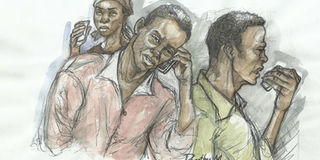Kiruhura murders and how other suspects were arrested

Dr Sylvester Onzivua
What you need to know:
- The cyber crime unit was tasked to track phone records of the family members of the late Daniel Karuhanga
- The head of the unit travelled to Kiruhura and secured a court order for records of calls, passing through the base transmitting stations of the mobile telecommunications networks.
The Uganda Police Force has a cyber crime unit under the directorate of information communication and technology, which was established in 2007. The Directorate among other things, is responsible for forensic investigations, monitoring and interception of communication, eavesdropping and debugging.
The cyber crime unit specifically handles cases involving electronic devices and monitors information from telecommunication companies. Working in the cyber crime unit are certified ethical hackers who are legally authorised to hack into systems and check for any threats and recommend counter measures.
In 2013, the cyber crime unit was instructed to support the team that was investigating the murder of Daniel Karuhanga and five of his workers in Kiruhura District. The investigating team was sure that a call had been made at the scene of crime soon after or at the time of commission of the crime.
The cyber crime unit was given mobile phone numbers to track. The investigators wanted the unit to establish which of the phones had made that call and the identity of the caller and the receiver. The analysis was done using a software that links phone numbers to areas and dates of calls.
The head of the unit travelled to Kiruhura and secured a court order for records of calls, passing through the base transmitting stations of the mobile telecommunications networks. The unit was asked to track the telephone records of the family members of the late Karuhanga, but none of the mobile telephone numbers was active the night of the murders and none of the phone numbers called any of the numbers that investigators classified as suspicious.
The call records in that area showed that a call was made from a phone number 0705-468148 which had frequently communicated with other numbers. The number belonged to one James Asiimwe and he was found to have communicated several times with one Juju.
The head of the unit therefore placed Asiimwe at the scene of crime at the time in question. The investigations then centered on communication between Asiimwe and Juju, Juju and Twazagye Bujolo.
Another contact, Nuwagaba Fred, was also of interest to the investigators. The four persons were subsequently arrested, charged and tried for the offences committed on the night of August 16, 2013.
During cross-examination, it was established that a telecommunications transmission station covers an area of a 10km radius and thereafter, the next station takes on calls outside this radius.
It was also noted that a less congested station may pick a call even if it is further from a caller. The transmission stations do not therefore pinpoint the location of a caller or receiver of a call and at the time in question.
The service provider was unable to record voices of the actual callers. The persons suspected to have had suspicious communication during the time of the murders were the following;
James Asiimwe
James Asiimwe told court he did not know the year he was born. He also said his parents died in 2004 and gave his home area as Kazo County in Kiruhura District. He was, prior to the date of the murders, a herdsman residing in Kiruhura Trading Centre, where he had lived for two years.
He was arrested from Kayanja, where he had moved to a few days before his arrest. He used to look after cattle belonging to Juju’s aunt. He also told court he knew Bujoro as a tipper driver.
Asiimwe acknowledged owning a phone but denied committing the offences he was accused of. He, instead, narrated to court horrifying tales of torture and enticement. He disowned the charge and caution statement attributed to him and told court that he was coached to say what he said when he was taken to reconstruct the scene of crime.
Mathew Mugoha Juju
At the time of the trial, the accused was a 35-year-old cattle keeper and a resident of Kiruhura trading centre. He retired from the army in 2005 and was walking with the support of crutches by May 2013.
He denied knowing Daniel Karuhanga, killing him and his workers. He, however, told court that he accompanied a friend, who was related to the deceased for burial.
Juju told court that he lost his cows when they were struck by lightning on August 2, 2013, two weeks before the murders, and he sought assistance from friends and relatives.
One of the people he sought assistance from was his paternal uncle, who was a minister and it was while he was seeking to see the minister that he was arrested. He also narrated terrible tales of torture.
Juju confirmed that Asiimwe used to work for his aunt but denied meeting with him on the 16th and 17th of August 2013. He also told court that he grew up and studied with Bujoro and that he last saw Bujoro on July 27 2013.
On the night of the murders, Juju told court that he spent the night in the house of his father-in-law and he was with other people. Before he left, he was given two cows by his in-laws.
To be continued




